Stephen Roney's Blog, page 191
July 31, 2021
What Andy Warhol Was Really Up To
Returning from a big Andy Warhol exhibit at the Art Gallery of Ontario:
The interpretive panels from the curators, and the audio guide, insistently aver that Warhol, with his Campbell Soup Cans and so forth, or sticking a French ad in his painting of the Statue of Liberty, was making ironic comments on American consumerism, mocking American pretentions of “liberty” and “democracy.”
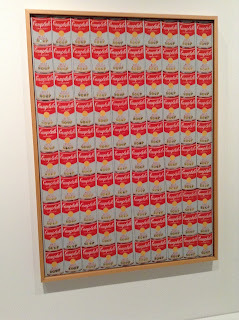
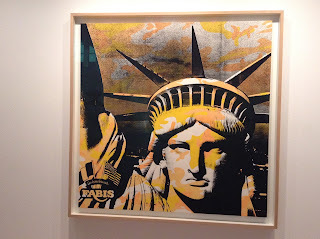
I don’t believe that. That is just what the cynical cognoscenti want him to be doing, and perhaps assume he must be doing. There is nothing in the works themselves to signal ironic intent, and if there is not, we have no business assuming one. Warhol’s Campbell Soup Cans are unpretentiously beautiful. That’s it. He sees their beauty, and celebrates it, wholeheartedly, just as he does with Marilyn Monroe, or Debbie Harry, or Karen Kain. He is an artist. He is into beauty.
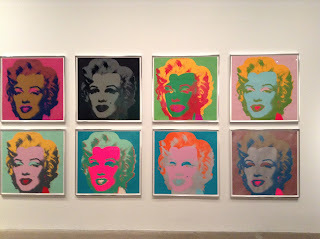

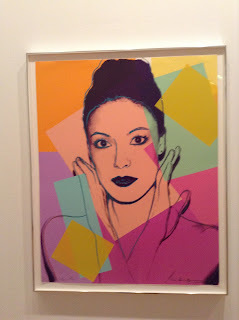
Warhol was consistently and unironically celebrating American consumer culture, which is to say, its truly democratic popular culture and the beauty of everyday life. Everyone needs to eat. It is not conspicuous consumption or “consumerism” to buy a can of soup; this is poor man’s food. In America, everyone can afford a can of Campbell’s soup. Everyone can afford to go to the movies. And the design of the Campbell’s soup can, or the Hollywood movie, created to appeal to the taste of the masses, ought to be appreciated as much as any European high art, created for the tastes of the high and mighty. Accident of birth did not make them better arbiters of beauty.
Coming from a poor immigrant family, Warhol embraced it all. He once said “Making money is art and working is art and good business is the best art.”
He also once asked an interviewer, “Is an artist allowed to be a Republican?”
And that is about all we know about his politics.
The exhibit curators also made much of Andy Warhol’s supposed homosexuality, and paint him as a pioneer of gay culture—one of the first celebrities to be publicly “gay,” to be “out.”
Again I think this is bollocks. It is what they want him to have been, for political purposes, not what he was. Interviewed in the 1980s, Warhol claimed to be a virgin. Close friends say they think this was probably true. By proper definition, then, he was not a homosexual. A homosexual is someone who has sex with other men. He was more like a secular monk.
The evidence that he was homosexual is apparently that he dressed distinctively, with a silver wig; and that he did many portraits of anonymous New York drag queens.
He did those many portraits, I submit, not because he was trying to make any political or personal statement, but because he found them beautiful, and in an unpretentious, unsophisticated way. Just as he did Campbell’s Soup cans, or Elizabeth Taylor, or Dolly Parton. No need to see anything sexual about it. He was in open rebellion against “good taste”; that was an upper class, exclusionary, attitude to art. Transvestites were all about beauty without the pretensions of taste.
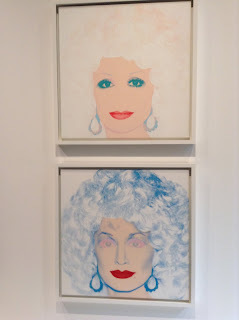
If Warhol himself dressed flamboyantly, it was for the same reason.
Curators also commented on Warhol’s “obsession with death.”
Indeed. Warhol was a devout Catholic, who attended mass daily.
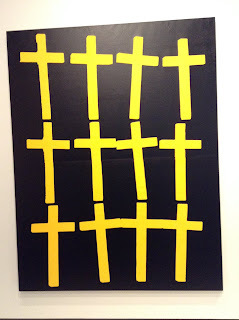
Any good Catholic should have an “obsession” with death. Death is what life is all about. The memento mori is a traditional Catholic meditation, and is highly recommended.
It all makes me despair of art, and feel sorry for Warhol. What is the point of being a great artist or a great writer? You will just be forever misinterpreted by the academicians and the cocktail circuit. They will always put lipstick on your Mona Lisa.
July 30, 2021
Ontario Place
 From the CBC
From the CBCOntario Premier Doug Ford today held a press conference at Toronto’s Ontario Place to announce plans to rejuvenate the park. This was, to my mind, very good news. Ontario Place had somehow been allowed to fall into disrepair, and in the last few years had become only another nature park. I feared it would remain no more than this.
Nature is a grand thing, no doubt. But Ontario, with almost 90% of its land area undeveloped, is not short of nature. Toronto is not short of green space.
Another rumour was that the site was going to be turned into a casino, or condominiums. Good for government revenue, and Toronto needs housing, but not very exciting.
I am happier to see it continue as it previously was, a family destination; originally it was like a miniature compensation for Montreal, and not Toronto, hosting Expo 67. We need places close to the city where the urban poor can take their kids to get away from it all. We need places where we can meet and form shared memories. there is a kind of urban heritage to be preserved here. Too many people have too many fond memories of Ontario Place from childhood to let it go. That would be painful in the way Montrealers lament the loss of Belmont Park, or Torontonians Sunnyside, or New Yorkers the Brooklyn Dodgers.
We also needed something cheering like this to bring us out of the pandemic doldrums, and to help the tourist trade recover. We need at least the promise of a party.
But one thing about the announcement was both troubling and absurd. It began with a sort of bland sermon by the chief of the Mississagua Indians, whose reserve is near Brantford. Each speaker in turn then began by acknowledging that “this ceremony takes place on the traditional lands of the Mississauga.” The chief spoke again to conclude the function.
In short, this guy, who represents two thousand people in another part of Ontario, was being treated as the feudal lord of the land.
In fact, Ontario Place was never in a literal sense part of the lands of the Mississagua Indians. It is an artificial island, built from the lakebed in the early 1970s.
But even if it were not, why this special treatment? Like the Indians throughout most of Canada, the Mississagua unambiguously renounced any claim to the lands on which Toronto was built in return for compensation some years ago. Is it sensible to forever commemorate this? What about commemorating the French, and the British, who also once made some claim to this land?
Because, you may argue, the Mississagua, unlike the French, or the British, were aboriginal here.
They were not—literally, no more than were the French. The French moved into the area from their base in Montreal in the Seventeenth Century. So did the Mississagua, coming from their previous lands north of lakes Huron and Superior after the Iroquois had pretty much wiped out the Huron and other Iroquioan tribes living around the lower Great Lakes. Thanks to firearms they got from the Dutch.
Canadians seem to be aggressively adopting an official class system and a ruling class; for no comprehensible reason.
'Od's Blog: Catholic comments on the passing parade.
July 29, 2021
Biden Keeps on Truckin'

There’s a lot of current buzz about Joe Biden claiming at a trucker convention that he used to drive an 18-wheeler. Of course he hasn’t—that requires special training and a special license. Why would he tell such an obvious lie?
Senility. Imagining things in just this way is a classic symptom. My elderly uncle insisted in a matter-of-fact way he had seen sea serpents in the Saskatchewan River. More specifically, a senile narcissist. He sees a truck, and imagines it is about him.
Getting an Education at OCAD
 OCAD's appropriately postmodern architecture.
OCAD's appropriately postmodern architecture.Noticed recently: a job ad for OCAD University’s English Department. It is jarring to see the courses for which they want instructors. English lit is no longer about what you think it is.
COURSE TITLE: ENGL-2003 POSTCOLONIAL LITERATURE
COURSE DESCRIPTION: This course looks at national and transnational literatures in a comparative perspective, focusing particularly on constructs of nation, gender, colonialism, and difference. Its aim is to imagine multiple literary times and spaces grounded in different parts of the world and in their different histories. That is, rather than creating a snapshot or conducting a literary tour of the world, this course seeks to refuse an easy commodification of Literature as a global product. All texts will be studied in their original English or in English translation.
To look at “postcolonial” writing from non-Western cultures is to severely limit one’s exposure to foreign culture and foreign ideas. These are necessarily drawn only from the postwar period, and are in the Western idiom, written by authors educated in the West.
Students should be exposed instead to Rumi, Li Bai, Basho, the Ramayana, and the like. That would give them a non-Western perspective. That’s the last thing they’ll get here.
And the focus is to be on “nation, gender, colonialism, and difference.” Only contemporary concerns of the political left. No new ideas or new cultural perspectives to be risked here.
COURSE TITLE: ENGL-2011 LITERATURE AND SOCIAL CHANGE
COURSE DESCRIPTION: This course takes a close look at the relationship between literature and concerns for equity, sustainability and social justice, focusing on the ways writers, artists and intellectuals work as agents for social change. The course discusses representations of topics such as dis/ability; gender, sexual and racial equity; labour activism; demands for Indigenous sovereignty; critiques of settler colonialism; postcolonial struggles against empire; and calls for environmental preservation. Texts are disciplinarily diverse and may be performative as well as written. Forms include comics, nonfiction, fiction, poetry and more.
All politics, no literature. “Texts may be performative.”
COURSE TITLE: ENGL-2012 TRANS AND QUEER LITERATURE
COURSE DESCRIPTION: In this course, we explore the ways in which sexualities, gender identities and sexual politics are addressed in literature. Texts will be by transgender, lesbian, gay, bisexual, two-spirit, queer and asexual creators, and will reflect the complicated nature of queer life. Intersectionality will be a guiding principle, as we examine ways race, gender, language, culture and disability justice intersect within representations of queer life across a variety of literary forms, such as fiction, nonfiction and memoir, poetry, drama and comics.
The subject matter is of obvious interest to, at a maximum, three percent of the population, in aggregate. The texts are also limited to that same three percent. Realistically from only the last couple of decades as well, because before that there was no market for gay lit. Yet this course is apparently offered every semester. One suspects the primary objective is to give sexual adventurers of various types an opportunity to meet, identify their preferences, and hook up.
Then finally something that almost looks sensible. They want someone to teach a course in Children’s Literature. An important and neglected field.
But you have to know that critical theory has a special focus on Children’s Literature. For the obvious sinister reason: they want to indoctrinate, and they think the best approach is to get them as young as they can.
COURSE TITLE: ENGL-2010 CHILDREN'S LITERATURE
COURSE DESCRIPTION: This course aims to answer the question: What is children's literature? The course will survey children's fiction, poetry, and picture-books to introduce students to a wide range of children's literature. We will examine different cultural and critical approaches to this field in relation to cultural interpretations of childhood and gender. As we discuss the social and political visions put forth in these texts, we will consider the effects of publishing and the media (for example, the Harry Potter films) on the field of contemporary children's literature. Our analysis of genre will include the study of the relationship between text and illustration. Course readings may include works by Carroll, The Brothers Grimm, Lewis, Rowling, Seuss, and others.
“As we discuss the social and political visions put forth in these texts.” The important thing about children’s literature is its political vision. Obviously, children and their own interests are of no concern here.
And OCAD is not unusual; I have seen similar course descriptions at Queen’s, for example.
The very least we can do is pull all taxpayer funding.
'Od's Blog: Catholic comments on the passing parade.
July 28, 2021
To Kill To Kill a Mockingbird

I am currently teaching Chinese students To Kill a Mockingbird. A book many want banned from North American schools. We are rapidly approaching a point at which Chinese will be better schooled in Western culture than Americans. At that point China will be ready to assume world leadership. China will be the cutting edge of human civilization. America and the West are deliberately throwing it away.
Those who want To Kill a Mockingbird removed from the schools do not understand the book. They are Philistines. Worse, they are racists.
One objection sometimes heard is that the book features a rape; and this is not suitable for young readers. But there is no rape in the book. The real problem here, I suspect, is that the book discusses rape in a way that is not helpful to feminism. It features a woman making a false accusation of rape. According to feminist doctrine, that can never happen. It notes that a rape charge requires some evidence that the woman resisted. Feminism says that is unnecessary.
In other words, the book is inconvenient in its assumptions to the modern left’s political agenda.
Another complaint is about bad language. The term “nigger” is used. But this is ironic, because the book is actually unusually delicate in its language, reflecting the Southern culture it chronicles. It refers obliquely and disapprovingly to “bathroom invective.” Rape is described only as “carnal knowledge of a female without her consent.” It threatens the villain with jail time for using improper language in the presence of a lady. In comparison to the typical current movie, the language in the book is almost humourously genteel. And “nigger,” after all, simply means “black.”
But the core and more common claim is that the book is racist because it is about white people, and the black characters in it are relative “ciphers.” A 2018 article in the Globe and Mail presents the case.
“There are far better books available for the purpose of teaching race to teenagers through literature.”
“That a 58-year-old book, written from a white woman’s perspective, should supersede award-winning stories from authors who live their racial realities once they put down the pen, is an absurd notion.”
“…We’ll have to let go of the false wisdom of Atticus Finch, and the haplessness of Tom Robinson, if we truly wish to educate young people who live in a world where it’s necessary to remind them that their lives matter.”
The underlying assumption of this criticism is that only black lives matter. To Kill a Mockingbird is simply not about black people. It is an exceptionally vivid bildungsroman of a young white girl growing up in the US South. Why is this intrinsically less interesting or valuable than a portrait of the life of some black person? Why is a “white” author not living her racial reality, but a black author is? Why is a book to be discounted because it is from a “white woman’s perspective”? What comment could be more flatly racist than that?
The book is not about race. It is about growing up, discovering the world is unfair, and how people deal with this: Scout in particular, Atticus, Jem, Judge Taylor, Heck Smith, Maudie, Boo Radley, Calpurnia, Tom Robinson, and so on. To make it about race is to, literally, miss the plot. The plot is about Boo Radley, not Tom Robinson, and Scout is the protagonist, not Atticus. This is clear at the book’s opening, its ending, and throughout. Tom Robinson’s trial is a subplot. The black characters are relative ciphers because they are not the main characters. Mayella and Robert Ewell, the other key characters in the subplot, are equally relative ciphers; but white.
It might be of some value to teach a book giving the black experience in the US South during the time of the Jim Crow laws. But it would be far less relevant to anyone for simply being that than a classic like To Kill a Mockingbird, which deals not with the particular experience of a particular group of people at a particular time in the past, but with universal human experience.
'Od's Blog: Catholic comments on the passing parade.
July 26, 2021
UK OK?
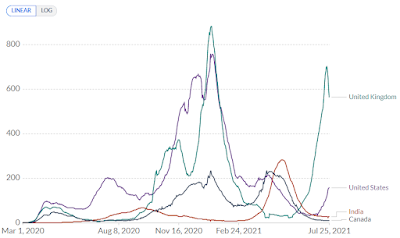
It looks as though Britain may be the first nation to achieve herd immunity to COVID. And it was not all that painful. England opened up on July 19. Cases soared. But deaths did not. Now, the rate of infection has begun falling as quickly as it rose—and in the UK, the reporting system is very good. There might be a new spike in the fall; there might be some new variant. But thiis looks promising. Past drops seemed to reflect measures like lockdowns, masking, and vaccines. This time, most folks are already vaccinated, and other measures have been mostly removed. What else but growing herd immunity could be causing it?
The Scream
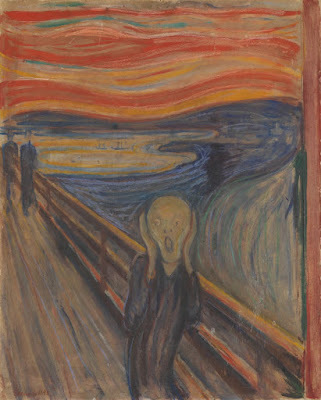 Original title: "The Scream of Nature"
Original title: "The Scream of Nature"
Edvard Munch’s “The Scream” is a portrait of his own anxiety disorder. He describes the experience it represents:
I was walking along the road with two
friends – then the sun went down
Suddenly the sky turned blood-red
– and I felt
a breath of melancholy
– an exhausting pain
under my heart – I paused, leaning against the fence, tired to death – above the blue-black fjord and city there was blood ‹in› tongues of fire
My friends went on and I stood
there trembling
with anxiety –
and I felt that a great infinite scream went through nature
(Diary, 22 January, 1892)
It is not Munch screaming, not the distressed face in the picture. It is the cosmos around him, the very sky, that is screaming.
This is how real depressive anxiety feels. The real “disorder” is not in the individual soul, but in their environment.
July 25, 2021
Electing Past US Presidents
YouTuber Mr. Beat has revealed which candidate he would have voted for in each US presidential election since George Washington. He has left out those presidents elected in his own lifetime.
This seems odd to me: these are the very presidents on which he would have the most informed opinion. And if he is concerned about revealing his political bias, he already has, with his picks to this point.
I think I’ll fill in the elections since I first began to follow US politics, at the early age of seven. As a non-American, I didn’t vote for any of these folks.
1960—Kennedy vs. Nixon.
Kennedy, hands down. I was an Irish Catholic kid. There could be no question but supporting Kennedy, and putting at rest the ghost of Al Smith. Electing Kennedy felt like the dawn of a new millennium.
1964—Johnson vs. Goldwater.
Goldwater. I had an instinctive dislike and distrust of Johnson. He was a crook. Goldwater seemed a straight shooter. And I think, even in retrospect, Johnson was a terrible president. Goldwater too might have gotten the US bogged won in Vietnam—who knows?—but he would not have made all the expensive mistakes of the “Great Society.” And he would have set a model of honesty. History might have been very different, and much better.
1968—Nixon vs. Humphrey.
I really disliked Humphrey. McCarthy would have been my guy. Humphrey appalled me by speaking, in 1968, amidst the Vietnam War and the assassinations of RFK and Martin Luther King, of “the politics of joy.” And of referring to Nixon’s refusal to debate as “our Vietnam.” He struck me as the ultimate gladhanding two-faced professional pol. But Nixon was worse. I believe I can just look at some people, and see a darkness in their soul. Nixon was the first guy in whom I noticed this. He never looked comfortable, because he never told the truth. He was an almost satanic figure, in my mind.
1972—Nixon vs. McGovern
I had nobody to vote for. I liked Muskie, and I think McGovern stole the nomination by juking the rules beforehand. He was a cloying figure. And he sold out Eagleton; so much for imagining he was principled. But Nixon was beyond the pale. I would have had to vote McGovern.
1976—Carter vs. Ford
Another awful choice. Jerry Brown was my guy. Carter struck me as both utterly insincere and dangerously underqualified for the presidency. But Ford struck me as out of his depth as anything more than the president of a local Rotary. With his idiotic “Whip Inflation Now” pins. Yeah, that ought to do it. And I felt the Republicans had to be punished for Watergate.
1980—Reagan vs. Carter
Getting rid of Carter felt like a blessed relief. I was not sold on Reagan as nominee, but at least he looked like a leader. I probably would have voted for anyone the Republicans nominated to get rid of Carter. Not because he was a bad man, but because he was incompetent.
1984—Reagan vs. Mondale
Definitely Reagan. Mondale looked to me like the typical unprincipled panderer, an impression sealed by his selection of Geraldine Ferraro as his running mate.
1988—Bush vs. Dukakis
I would have voted Dukakis. Bush alienated me with his Willie Horton ad, which I thought was racist. It also made capital punishment a hot button issue. I was opposed to capital punishment, and if this was the issue I had to vote against. Bush also alienated me with a call to make burning the American flag a criminal offense. He seemed to pander to voters’ worst instincts. Dukakis looked like a lightweight, but seemed a decent guy.
1992—Clinton vs. Bush vs. Perot
I felt Bush had to be voted out after breaking his “read my lips—no new taxes” pledge, or no politician would ever feel the need to tell the truth or keep a promise ever again. Clinton was one of the “seven dwarfs,” a historically unimpressive Democratic primary field. He was underqualified, and a huckster. I would have voted Perot, for his concern over the national debt.
1996—Clinton vs. Dole vs. Perot.
Dole. Dole was a bright guy, and I felt he had earned it. He was more qualified than Clinton. It would have been nice to have a president with a sense of humour. And the sleaze of the Clinton administration was alarming.
2000—Bush vs. Gore
Bush. Gore was the originator of the Willie Horton hit. Another guy who seemed uncomfortable in his body, because he was not truthful. Another dark face. And it seemed to me the Democrats needed to be punished for the sleaze of the Clinton years. It was time to clean house. Gore impressed by choosing Lieberman for VP, though. Bush looked like a lightweight, but at least like a decent guy.
2004—Bush vs. Kerry
Bush. Kerry gave me the creeps. Another dark, insincere face. Especially trying to capitalize on his military service, when he was so critical of the military he served. I felt no ambiguity in cheering for Bush, even though I doubted his abilities.
2008—Obama vs. McCain
McCain had been my preference for Republican nominee back in 2000. He seemed like a real straight shooter, and I thought he’d earned it. Obama was seriously underqualified. He’d have been a better president with a few more years’ government experience; and he had lots of time left in his natural career. It is probably a curse to be elected president too young.
2012—Obama vs. Romney
I wanted to see Gingrich get the nomination. But given the choice, Romney. Romney seemed to have demonstrated truly impressive executive competence. And seemed to be a moral character. Let him get in there and tidy up a bit. Get some honesty back in government.
2016—Trump vs. Clinton
I did not want Trump to get the nomination. But since he was nominated, Trump over Clinton. Clinton looked to me like a criminal, and possibly a Russian asset. Were she to be elected, the US would only be embroiled in the need to impeach her.
2020—Biden vs. Trump
So they ended up trying to impeach Trump for the crime Clinton was probably guilty of. The violent reaction of the media and the Democratic opposition to Trump demonstrated the need to have elected him. Something was obviously seriously wrong in government, and we needed an outsider to fix it. This time there was no question in my mind. It was fantastically dangerous to elect Biden, because he was not competent to be president, and would be controlled by some unknown party or parties. It looked like a perfect setup for a fascist government to take over. It still does.
'Od's Blog: Catholic comments on the passing parade.
Lamb O'God!

I note with surprise that the broadcast mass from the National Cathedral in Washington today included the Agnus Dei sung in Latin. This is the first time I can recall them doing it in Latin. Is this a subtle signal of defiance towards Pope Francis’s restriction on the Latin mass, or a signal of solidarity with traditionalist Catholics?
July 24, 2021
The Living Dead
Why are zombies so compelling? And not compelling only to me; they have earned a central place in popular culture.
And if they are so compelling, where were they in the past? Our modern conception of zombies dates only from Night of the Living Dead, 1968.
I think everyone half-understands what the zombies represent. We knew in the 60s. They represent the growing postwar trend to godless materialism. To reject God and the absolute—truth, beauty, and the good—is to lose one’s soul. One is just a walking carcass.
The zombies are antifa, the postmodernists, the critical theorists, the Nazis—see Ionescu’s 1959 play Rhinoceros. All these mass movements that rely on aggressively enforced shared delusions.
And they are coming to get you.
'Od's Blog: Catholic comments on the passing parade.



